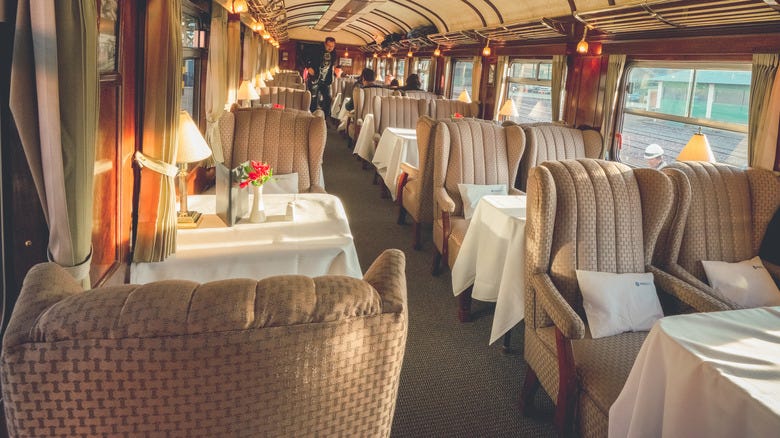An antique British Rail dining car.
In his latest Substack posting, Garrison Keillor describes visiting Edinburgh and being transfixed by seeing two young women with the same red hair as himself, evidence of his Scots ancestry.
There's much literature on such cultural epiphanies. My favourite is in The Great Gatsby, where a stranger asks newcomer Nick Carraway for directions and "casually confers…the freedom of the neighbourhood."
Nothing like this has happened to me in France. I remain an interloper, “the black swan of trespass on alien waters,” as the poem goes. But I can still remember when I "got" England - or as much of England as it's ever prepared to give.
In my fifth winter, I was living in East Bergholt, in Suffolk, but spending a lot of time in London. Whenever possible, I'd catch the 4.30pm train from Liverpool Street to Colchester, because on that service a single ancient dining car offered afternoon tea.
In total silence, one took a seat amid the varnished woodwork and faded plush. As the train pulled out, a steward in an over-starched and fraying short white jacket of the kind known as a “bum-freezer” passed through, enquiring "Are you taking tea?" Any non-tea drinkers who'd strayed in were ejected. The rest of us received a cup, saucer, plate, knife, fork, teaspoon, cloth napkin, and individual milk jug, battered silver-plated tea pot and jug of hot water.
Once we’d poured our first cup, a dish of toasted tea-cakes arrived, the initial instalment of the Full British Rail Afternoon Tea. From watching the regulars, I’d learned the etiquette. One was entitled to one tea-cake top and one bottom but not two of the more crunchy and flavourful tops. Equally, it was appropriate to take one slice of white buttered bread and one of brown, but not two of either. And if you'd had bread, only a hog would then also help himself to the slices of moist fruit cake that followed.
The sandwiches, though, were the real test. On soft white bread, cut into quarters, with the crusts off, they invariably contained hard-boiled egg, meat paste, cheese, and cress - from which you chose no more than one quarter of each filling, to a total of four - known, for reasons never explained, as a “round”.
Having mastered the rules, I relaxed into the resulting predictability as into a warm bath. So I can still remember the moment during the third month of my commuting when the man opposite, on being offered the sandwich dish, said with enthusiasm "Oh, great. My favourite" - and helped himself to five quarters of potted meat!
All of us in the carriage were perfect strangers, but instinctively my neighbour and I turned to one another and silently raised our eyebrows.
Shortly after, I left England to live in the United States. Probably just as well. Had I stayed, I'd probably be wearing tweeds by now and writing letters to The Times, urging the return of fox hunting and capital punishment. But I never forgot that kindergarten pleasure at knowing instinctively the right thing to do, and doing it; of possessing “the freedom of the neighbourhood”




